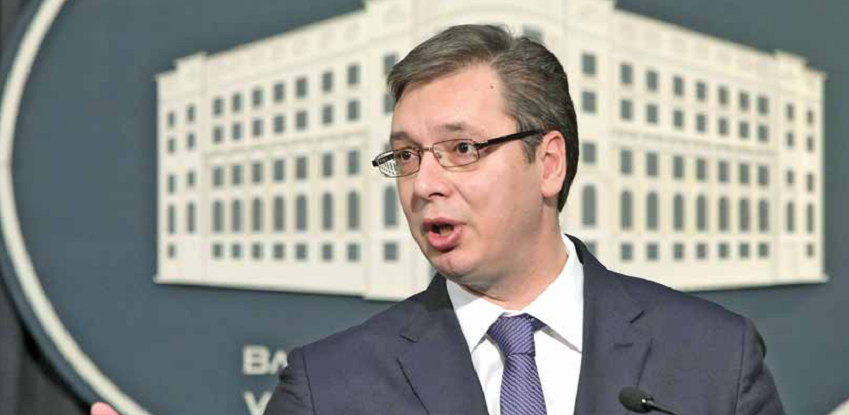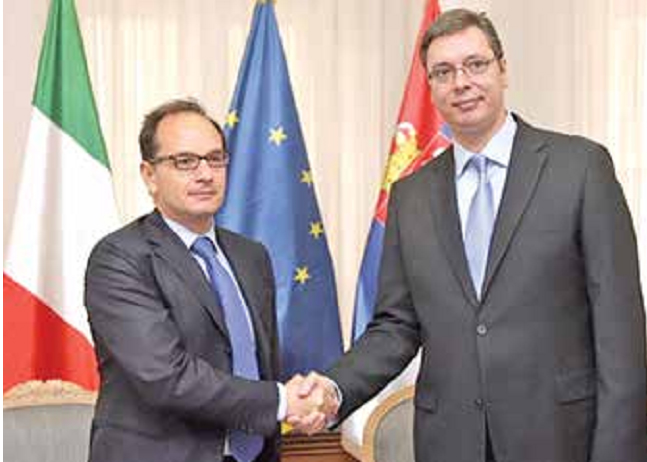It could be said that economic cooperation between Serbia and Italy can serve as a model of good economic cooperation between any two countries.
Italy is Serbia’s most important foreign trade partner and is among the top five countries in terms of investment. Over 650 Italian companies are present on the Serbian market and employ over 27,000 workers, mostly in finance, insurance and the manufacturing industry, says Serbian PM Aleksandar Vučić
Please provide us with a brief overview of the major goals of the new government?
The pillars of the new government’s programme are economy and better living standards, full political stability, both in the country and in the region, reform of judicial system, fighting corruption and crime, as well as better education and healthcare.
Important years are ahead of us and economic growth will reach 2.3% this year. We’ll have the strength for that; today you’ll see economic indicators that prove this.
I have already presented to the public the Ten Point Plan highlighting the areas which need serious improvement in order to make Serbia a modern and organised country. The programme is based on a realistic basis and I expect the government to be formed by the end of the first half of June.
How do these goals fit into the broader Serbian agenda in terms of the EU integration process?
In the Government of Serbia we don’t steer parallel agendas. There is only one existing agenda, with solid and precise goals to be achieved. This corresponds fully with our European path and the goals and standards we want to achieve. We want to have Serbia as a fully-fledged member of the EU. More importantly, we want to ensure Serbian citizens live well and are decent citizens of Europe. This cannot be achieved if you either compromise on goals or change goals depending on the political agenda before and after the election campaign. On the contrary, it is because we insist on having a fully legitimate government for the continuation of difficult structural reforms that I called an early election two years before the end of the mandate of the previous government. I did it when we managed to stabilise fiscal and macroeconomic parameters around the Maastricht Convergence criteria.
How do you assess bilateral relations with Italy and its support to Serbia’s EU cause?
There is one word which is overused in our political life and international relations as well. Too often we exploit the term strategic. In the case of Serbian–Italian relations, I would dare to say that, yes, truly, Italy is a strategic partner of Serbia. With strong support to our European endeavours, we cultivate even stronger political relations with the Italian government, the strongest relations we may find in our economic performance. It could be said that economic cooperation between Serbia and Italy can serve as a model of good economic cooperation between any two countries. This is confirmed by the level of bilateral trade,totalling over 3.6 billion euros in the last year, which is about a quarter of the total goods trade between Serbia and the EU. A large number of Italian investors – over 650 companies – are present on the Serbian market and employ over 27,000 workers, mostly in finance, insurance and the manufacturing industry. Apart from large company Fiat,which has a car factory in Kragujevacand is the largest Serbian exporter, there are also Banka Intesa, Generali Insurance, Benetton, Geox, Golden Lady, Calzedonia, Confezioni Andrea, UniCredit Group, MagnetiMareli and many others.
Italy has provided strong support to Serbia’s EU integration process, but there is also growing interest among Italian companies for cooperation with the Serbian economy and investing in the Serbian market. We should develop our relations further and even more ambitiously, in diversifying our economic, political and cultural relations. Finally, we should continue presenting Serbian-Italian relations as a success story and as a role model for strategic relations generally.
Where do you see room to further develop economic bilateral cooperation?
Cooperation between Serbia and Italy is characterised by the vast scope of trade agreements from the fields of joint investment and manufacturing cooperation, as well as by an outstanding level of collaboration in the fields of banking and finance, transportation and tourism.
Speaking of possibilities and the prospects of further economic cooperation with Italy, the following sectors have been recognised as having constant, and so far mutual, interest for investment: the automotive and metal industries, the textile industry, wood processing, IT, agriculture and renewables.
What are your major objectives in terms of economic reforms that may furtherspur this cooperation?
One of the main achievements of the Government in the previous period was to create a completely new legislative framework in the field of investments. With regard to such legislation, the main achievements are establishing clear rules and procedures on the establishment of cooperation with investors, which made a decision to launch business in Serbia, providing them with various reliefs and incentives, to present terms and conditions for starting business in Serbia making them easier for investors,to make the whole investment environment more attractive in municipalities and the Republic of Serbia as the investment location, as well as to ease cooperation between commercial companies from both sides.
How will these goals be supported by legislative changes and practice?
Legislative changes have already been undertaken, meaning the passing of the Labour Law in the summerof 2014, the Law on Investments in the autumnof 2015– with the objective of improving the investment climate, promoting direct investments, increasing efficiency in the provision of services to investors and ensuringthe greater protection of investors’ rights.
What do you perceive as the priorities of the new government in terms of improvement of the overall business climate in Serbia?
The main goals are supporting the development of entrepreneurship, decreasing the cost of fiscal and other levies for launching a business in Serbia, active employment measures, increasing the availability of financing sources and attracting major investors to come to Serbia in order to spur the industrialisation process in Serbia.On the World Bank’s Doing Business List 2016, Serbia moved up 32 places and we want to continue this trend. We will invest in the employment of highly educated workers, engineers and programmers, and we will work more on connecting foreign investors and the local economy through supply chains.
There is a lack of industrial zones with proper infrastructure, especially on the new Corridor 11 route, which is very important because of the great potential for agricultural production in West Serbia.
It should be emphasised that the economic policy measures implemented by the Serbian Government over the past two years have met with quite positive reviews from the European Commission, especially in the area of fiscal consolidation and the creation of a good business climate. What is particularly important for Serbia is the fact that Serbia has a three-year standby arrangement with the IMF and that the reform agenda is being implemented in cooperation with IMF. One of the important targets of Serbia’s economic policy is to raise the competitiveness of the Serbian economy, so that it is ready to take part in the demanding EU market once Serbia joins the EU.
In which areas do you intend to further enhance the implementation of legislation at the national level, and especially at the local level?
It is important that municipalities improve their business climate. Therefore, the Law on Investments gives a greater role to local authorities, and sets the obligation that the authorities at the local level must form their units as investment support at the local level and to issue all relevant documents to investors within the shortest possible period of time. Besides that, the aforementioned Regulation on Standards of the Favourable Business Environment in Municipalities and Cities has been adopted by the Government. The main result expected is that municipalities will be ready to offer investors appropriate and equipped business zones.
What is in store for incoming investors?
There is strong support for foreign investments, with a focus on new employment. To offset initial capital investments and ease the start-up of business endeavours, the Government of Serbia offers financial support for both Greenfield and Brownfield projects in manufacturing and the service sector, which may be the subject of international trade, which reaches up to 50 per cent of overall investment.
Also, manufacturing activity in Serbia has great potential to benefit from the unique set of Free Trade Agreements that enable companies to export their products to the U.S., the EU, EFTA, CEFTA regions, Russia, Turkey and other countries, with minimal or no import duties. Together, this creates a free trade market of 1.1 billion consumers for “Made in Serbia” products.
Investors can benefit from 14 Free Zones in Serbia, with exemptions from VAT, as well as customs and clearance duties. There are 220 multinational companies, employing more than 20,000 Serbian workers and having a total turnover of five billion euros, which have already taken advantage of these benefits.
How does the government intend to reform education in order to better meet the market demands?
We have to work harder on reforms of the education system, to adjust it to meet the demands of modern businesses and create high quality labour for the Serbia of tomorrow. New technologies and modern manufacturing processes require new education profiles. They cannot be created at once, and thus the Serbian Government – in cooperation with the Serbian Chamber of Commerce – has started to change the legal framework in the past year, so that the Dual Education System, which turned out to be a very successful model in some countries, could be implemented. This will be to the benefit of both the economy and the State: entrepreneurs will receive qualified workers and the State will be able to decrease the unemployment rate drastically among the youth.

